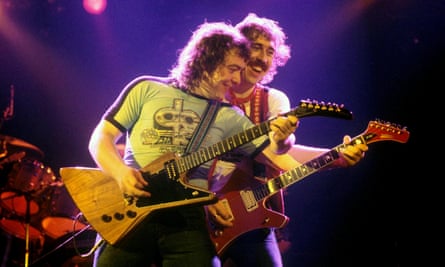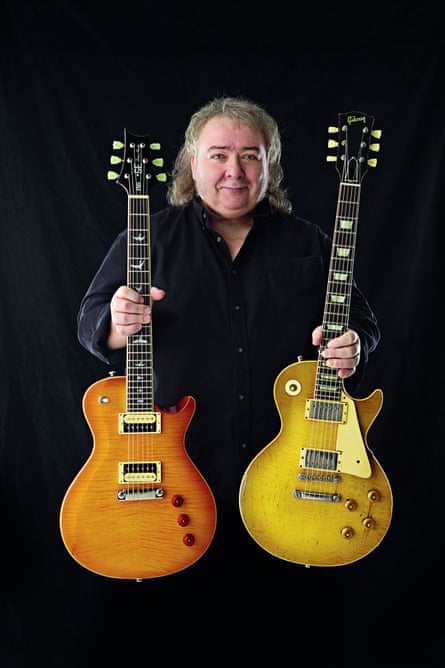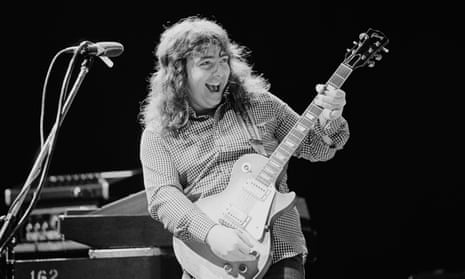Described by Guitar World magazine as “one of the finest British players to ever pick up an electric guitar”, Bernie Marsden, who has died aged 72, was best known for his work with Whitesnake, the band formed by the former Deep Purple vocalist David Coverdale in 1978. Coverdale described how “I’d met Bernie casually in Munich when he was with Paice Ashton Lord. He asked what I was doing in town [London], and on being told immediately offered to come and help out … shrewd, was ol’ Bernie.”
Marsden’s powerful and expressive playing, as well as his songwriting skills, made him a mainstay of Whitesnake. He appeared on their debut EP, Snakebite, as well as their first five studio albums and the in-concert set Live in the Heart of the City, which reached No 5 on the UK chart in 1980. It was one of a stream of high chart placings. Lovehunter (1979) reached 29, Ready an’ Willing (1980) reached No 6 as well as entering the US Top 100, Come an’ Get It (1981) went to No 2 and Saints & Sinners (1982) reached No 9.
Marsden co-wrote the band’s first big hit single, Fool for Your Loving (13 in the UK, 53 in the US), and the Top 40 hit Would I Lie to You. Above all, he wrote (with Coverdale) Here I Go Again. This reached 34 in the UK in 1982, but Whitesnake re-recorded it in 1987 as a beefed-up power-ballad that reached No 1 in the US and 9 in the UK. However, by that time Marsden was no longer with the band. Two years later, Fool for Your Loving was given a similar sonic overhaul and reached the US Top 40.

Bernie, the only child of Joe and Kathy Marsden, was born on the Westfields estate in Buckingham. In his book Where’s My Guitar? (2019), he wrote that “my mum and dad were working-class parents and boy, did they work hard”. When he was four, the family moved to a new council house in Overn Avenue. He failed his 11-plus and attended a local secondary modern school. Marsden did not go to university, but was delighted to be awarded an honorary master’s degree by the University of Buckingham in 2015.
He persuaded his parents to buy him a second-hand Spanish guitar, then traded up to an electric model after saving money from a paper-round. After playing with several local groups he formed Skinny Cat when he was 17. He told Classic Rock magazine: “I loved Hank Marvin in the Shadows as a kid, but Eric Clapton was the first guitar player I really adored, because I was old enough to relate to it. George Harrison comes into this as well, then it was Peter Green.”
Marsden turned professional in 1972 when he joined the hard rock band UFO. He remembered that his mother warned him about “the drink and drugs and wild women,” to which he riposted: “That’s what I want to do this for.”
However, he later admitted he had not been ready for what his new status entailed. “I was naive and green, and thought that joining a pro band and moving to London was going to be like the cover of a Beatles EP, with everyone jumping in the air and being happy,” he confessed. “It turned out to be anything but.”
He stayed with UFO only for long enough to play on a European tour and make a couple of demo recordings before he was replaced by the German guitarist Michael Schenker. In 1973 Marsden became a member of Wild Turkey, the band formed by the former Jethro Tull bass player Glenn Cornick, but this was another short-lived engagement. In 1974 he joined the drummer Cozy Powell’s new band, Hammer, which achieved little beyond recording a single, Na Na Na, which got them on Top of the Pops.

Marsden’s next stop was Babe Ruth, with whom he was able to record the albums Stealin’ Home and Kid’s Stuff. Then, recommended by Powell, in 1977 he signed on with Paice Ashton Lord, which featured the former Deep Purple members Ian Paice (drums) and Jon Lord (keyboards), with Tony Ashton on vocals and keyboards. The band split in 1978 after Ashton fell off the stage during a show in London and broke his leg. The group had managed a solitary album, Malice in Wonderland.
Now Marsden’s luck changed, as he was recruited to Whitesnake, another offshoot of Deep Purple. The group was assembled by Coverdale to promote his second solo album, Northwinds, and was originally called David Coverdale’s Whitesnake. The lineup teamed Marsden with a co-guitarist, Micky Moody, and after some live performances the group gathered in Central Recorders Studio in London and recorded the Snakebite EP, released in June 1978.
Two of the four songs, Steal Away and Come On, featured Marsden in the writing credits. He also suggested the group should cover Bobby “Blue” Bland’s R&B hit Ain’t No Love in the Heart of the City, which became a popular fixture in their live performances.
In October 1978, Whitesnake released their debut album, Trouble, the lineup now including Lord. It reached No 50 on the UK album chart. Marsden at last felt he was where he belonged, and said: “This is me, the first time I’ve played the way I really am. Whitesnake is a loud R&B band.”
However, Coverdale wanted Whitesnake to adopt a more polished, mainstream rock sound, with the aim of cracking the American market. While Saints & Sinners was still being recorded, a complicated dispute erupted between the band and their management, which left Marsden out of a job. Coverdale would subsequently assemble a new lineup. Marsden later took legal action to reclaim royalties owed to him.
He had already recorded a couple of solo albums, And About Time Too (1979) and Look At Me Now (1981). He formed a new band, Alaska, who split after recording a couple of mid-80s albums.
In the 90s he teamed up with Moody in the Moody Marsden Band, whose releases included Never Turn Your Back On the Blues (1992) and Live in Hell: Unplugged and Real Faith (both 1994).
With the addition of another Whitesnake refugee, the bass player Neil Murray, the group morphed into Company of Snakes, playing mostly material from the Whitesnake catalogue. This underwent various personnel changes before evolving into M3.
Marsden was a dedicated collector of guitars, and especially cherished his 1959 Gibson Les Paul Standard Burst, nicknamed “the Beast” and valued at over £1m. He published three editions of Tales of Tone and Volume, books of high-quality photographs of his instruments alongside his own descriptions and anecdotes.
He is survived by his wife, Fran (nee Plummer), whom he married in 1980, and their daughters, Charlotte and Olivia.

Comments (…)
Sign in or create your Guardian account to join the discussion